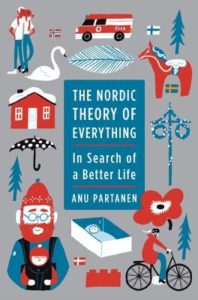
Imagine you wake up one day with universal health care, nine months parental leave, subsidized quality child care, five weeks paid vacation a year, free world class education from pre-school through university and affordable elder care. Would you dismiss these benefits as the trappings of a socialist nanny state that quashes any sense of personal determination while levying exorbitant tax rates? Or would you swallow that nagging sense of envy, and wonder how this is possible and where you can sign up?
Of course you want to know more and need to read Anu Partanen’s very timely book, The Nordic Theory of Everything – In Search of a Better Life (2016 Harper Collins Publishers). This is an eye opening primer on how the Nordic countries (Finland in particular) manage a societal structure that provides one of the highest qualities of life in the world. By contrasting everyday life in her native Finland to that of America, her newly adopted country, Partanen holds up a mirror that very kindly shows us where we stand as a modern nation. She moved here for love and has a great affection for America and its people, but her experience of the modern American Dream showed her a reality peppered with anxiety, stress and social injustice.
If you had dismissive thoughts about socialism, it would behoove you to read this book and gain a little perspective. The social benefits enjoyed by people in Finland are realized in a strong and competitive free market economy, governed by parlimentary rule. These benefits are funded by an average tax rate of 30%. (Do the math – it’s a good deal.) With equal benefits, all people in Finland are provided the optimum conditions for a life of freedom, independance and opportunity. The multi-party government operates on the principle of consensus. Finns expect nothing less than full transparency and flexibility from their elected officials.
One of the aims of the book is for Americans to look at our lives and understand that we can live them better. As we progress deeper into the twenty-first century, there needs to be a reassessment of our national assumption that a country with a strong welfare state (or “well being state” as Partanen views it) is weak. The rest of the developed world has realized that the true path to modernity is created by providing all citizens with a social support that forges a much stronger, happier and resiliant populace. We alone are falling behind the majority of the developed world in this regard.
This is not to suggest that we all become Nordic. Partanen instead posits that Nordic peoples and Americans share at their core an intense sense of individualism. Independence and self-sufficiency are key to the Nordic sense of self. Extend this value into relationships and the true beauty of this book is revealed: “that authentic love and friendship are possible only between individuals who are independent and equal.”
Partanen draws on the social research of Lars Trägårdh who coined the phrase, “the Swedish theory of love.” This explains that “the overarching ambition of Nordic societies during the course of the twentieth century, and into the twenty-first, has not been to socialize the economy at all, as is often mistakenly assumed. Rather the goal has been to free the individual from all forms of dependency within the family and in civil society; the poor from charity, wives from husbands, adult children from parents, and elderly parents from their children. The express purpose of this freedom is to allow all those human relationships to be unencumbered by ulterior motives and needs, and thus to be entirely free, completely authentic, and driven purely by love.”
“The Nordic theory of love” is how Partanen rebrands this concept. As the through line of the book, she highlights how it works in practice in the relationships of parents and children, men and women, employees and employers, and government and citizens. Imagine not having to take a specific job because of the health insurance, not being afraid of bankruptcy in the wake of a cancer diagnosis, not having to move heaven and earth to afford a college education, not having to choose between losing a job or caring for an elderly parent.
This is a heady notion — pure love equals freedom. Both exhilarating and terrifying. Remove dependency in a moral society and the only thing standing in the way of achieving your best self is your self.
Throughout her well-researched book, Partanen maintains a strong voice of optimism that given the full facts, Americans would jump at such a way of life. Being Americans we will represent many views on the whys and why nots this could work. What a hopeful thing that as a nation we could holistically look at our civil, social and political structures and seek to heal the root causes of inequality and injustice. As we perch on a tipping point seeking a way forward, hats off to Anu Partanen for bravely pointing out a better way, with love.
Leave a Reply